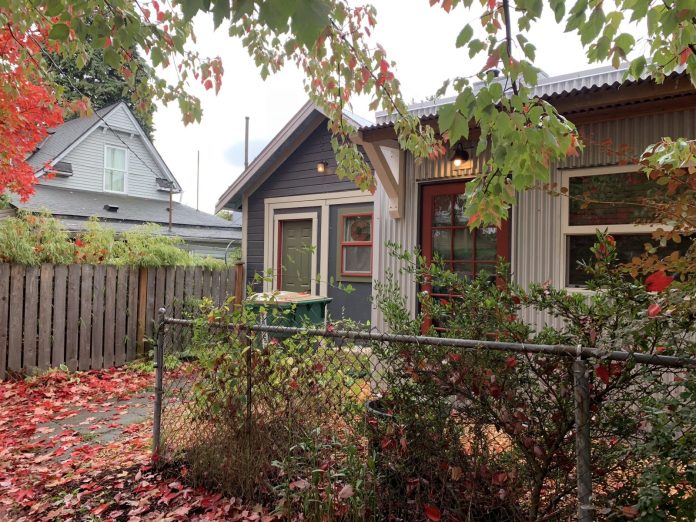
Two and a half weeks after the Bellevue Housing Research Coalition unveiled initial poll results showing broad dissatisfaction with the Bellevue housing market, the group has released a new batch of findings related to policies that could help initiate a course correction. The poll, conducted by Change Research, asked 475 Bellevue residents about their opinions on six housing policies that Bellevue City Council could enact to improve market conditions. All solutions had majority support, and three solutions were supported by three-quarters of Bellevue residents.
Of the Bellevue residents polled:
- 78% support creating additional home-ownership assistance programs to support first-time buyers and low-income households (18% oppose);
- 76% support encouraging the development of townhouses and rowhouses (18% oppose);
- 75% support allowing the construction of accessory dwelling units (ADUs), such as backyard cottages, in all neighborhoods (20% oppose);
- 65% support giving developers a density bonus, such as allowing taller buildings, if a minimum number of affordable homes are built as part of the project (29% oppose);
- 64% support relaxing restrictions, like building height limits, for projects that preserve existing mature trees on a property rather than cutting them down (29% oppose); and
- 51% support removing barriers to the construction of tiny apartments (200 – 400 square feet) (39% oppose).
The poll also found strong support for policies that specifically support the creation of affordable housing units. 69% of Bellevue residents would support requiring developers of commercial (i.e. retail or office) spaces to pay fees that Bellevue would use to fund affordable housing units. Only 26% of respondents opposed the policy idea.
With previous findings showing significant support (78%) for Mandatory Housing Affordability — a policy that would require developers to designate a portion of a project’s units as affordable — this poll indicates that Bellevue residents are interested in creating new funding sources for affordable housing.
Currently, funding for affordable housing in the city is mainly split across three programs. As part of its Capital Investment Program (CIP) Plan, Bellevue invests $2 million annually in “contingency funds” that can support affordable housing projects. Additionally, Bellevue is a member of A Regional Coalition for Housing: a partnership between King County and Eastside cities to build more affordable housing units throughout the region. As part of its membership, Bellevue annually contributes over $700,000 to the organization, including $412,000 towards projects and approximately $280,000 in administration costs.
By far, the city’s largest source of revenue for affordable housing comes from a 0.1% sales tax authorized by Washington State House Bill 1590, passed in the 2020 legislative session. Because Bellevue City Council voted to administer the tax itself rather than contribute its portion to a wider King County fund, the city collects between $9 and $10 million each year and allocates the funds to its newly-created Housing Stability Program. As reported earlier this year however, getting those funds into the hands of affordable housing and service providers has not proceeded without obstacles.
Although Bellevue’s annual investment of approximately $13 million towards affordable housing and requisite services makes an impact, City Councilmembers have expressed interest in creating further funding sources to complement these investments, given the significant dearth of affordable housing in the city. With a large amount of commercial development soon arriving in Bellevue’s growth corridors, a well-calibrated commercial fee could become a significant revenue source for additional affordable housing production.
The matter was actually floated as a potential addition to the city’s Next Right Work, a slate of housing policies that staff and City Council will tackle over the next 12 to 18 months. However, legal concerns raised during public comments by the Bellevue Chamber of Commerce and echoed from conservative councilmembers led to the issue being dropped from consideration at this time. Measures like commercial fees and MHA have often been characterized by detractors as unconstitutional “takings,” but when combined with additional policies that increase a plot of land’s overall value (i.e. upzones), this legal hurdle has thus far been mitigated.
The results released today show that many actions that Bellevue is pursuing as part of its Next Right Work have significant public support. For example, staff will be studying code amendments that will remove barriers to the construction of micro-unit apartments, and scoping work has been initiated to explore allowing missing middle housing typologies (i.e. duplexes, triplexes, backyard cottages, etc.) in more parts of the city. Additionally, staff are looking into reducing permitting fees, simplifying the permitting process, and increasing the allowed Floor Area Ratio (FAR) for residential development.
What’s clear from these poll results is, while residents support the actions being undertaken by city staff and councilmembers, there’s an appetite to go even bolder to encourage even more drastic steps to address the affordable housing crisis.
The Bellevue Housing Research Coalition is a partnership between the Housing Development Consortium, Eastside For All, Sightline Institute, the Northwest Progressive Institute, and Complete Streets Bellevue. (Full disclosure: the author of this article is the founder of Complete Streets Bellevue.) The poll was conducted between August 15th and 19th and has a modeled margin of error of 5.2%.
Chris Randels is the founder and director of Complete Streets Bellevue, an advocacy organization looking to make it easier for people to get around Bellevue without a car. Chris lived in the Lake Hills neighborhood for nearly a decade and cares about reducing emissions and improving safety in the Eastside's largest city.


